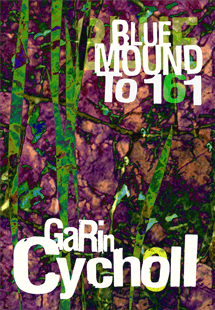

Garin Cycholl
Blue Mound to 161
ISBN 1-886350-97-3
6 by 9, perfect bound, 74 pages, $12
Poetry, 2005
Printed in a limited edition of 1048 copies
Winner of the Transcontinental Poetry Award
for an outstanding first book-length collection of poetry or prose
This book-length poem is an unconventional paean to rural Illinois and other points in the American midwest from the early 20th Century up to the present. Alternating verse, prose, and news and dialogue snippets, this poet has designed a quietly fragmented work with a wonderfully strange sense of time-place that’s simultaneously constant and disjointed.
-- English Studies Forum
Human physical traceries, voices, and stories haunt this book. The story of the soil alone gives these interwoven poems their essential reminders: we make our lives, if we are lucky, with perceptions that open us and are then folded, each into the next. Cycholl's vision is austere but vivid. Here is a world where roadmaps are alive; where ditches give birth to miniscule evolutions of the organic life-force; where golden birds' skyward passageways invite us to swift flight and blessed return.
—Judith Vollmer
What can be said about a region, including the scattered record of its geographers and teenage girls, farmers and coal miners, preachers and killers, state highways and the sanctuary of a good country library, is the poetry in this book. These categories in Cycholl’s usage are not mutually exclusive, yet the particulars of his work are worthy of Olson’s Bibliography for Ed Dorn. His method resembles the way “jazz is made / out of what else / but other things in / the specificity of / place.” I mean, because a plot to kidnap Andrew Johnson and the shooting of a man from his tractor are not noteworthy from 30,000 feet above Illinois, the poet travels with a deliberation increasingly special to the rest of us, who, it turns out, only thought we’d bought the same ticket. Previously, Vachel Lindsay’s response to a more central Illinois was to walk across it, into Kansas, distributing his own chapbook from farm door to farm door. Like Lindsay, Cycholl can write songs (“Song[s] of the Jonesboro Girls”), but he stays, dwells, inhabits the place the former poet died in. So much so that, in the
poem, a local girl complains, “There / ain’t fuck to do here if you / ain’t geography,” which can only mean that it’s still possible for the poet to be the genius loci.
—Richard Blevins
Beautiful and harsh, as haunting as a ghost story, and even—almost reluctantly— lyrical, this grand American song is fresh and powerful. Garin Cycholl dares to face the unforgiving music of long vistas, deep histories, and weed-rattling gravel lots. His book feels essential.
—Luis Urrea


